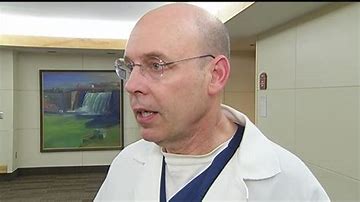Omicron B.1.1.529 -- a new and rapidly changing variant of the coronavirus that just this month was first identified by scientists in South Africa -- probably has found its way to the United States and should be considered as highly transmissible.
That's the opinion of Dr. Emil P. Lesho (photo at right), an Infectious Disease specialist with Rochester Regional Health, who addressed the media this morning via Zoom.
When asked about Omicron's impact in the Finger Lakes Region, Lesho said it's a bit early to tell, but "the quick answer is … it's likely in the United States."
"At last count, it was reported in 13 different countries, including Canada. So, it was first detected in South Africa … that doesn't necessarily mean that's where it originated, that's where it was detected first," he said.
Noting that the variant has been linked to travel, he said the detection process "requires advanced whole genome sequencing (and) most hospital labs in the United States can do that technology."
"Specimens have to be collected first, then they have to be prepared, then they have to be sent to a special sequencing laboratory," he said. "So, that takes time. But as we speak, Rochester Regional is looking for this variant. We have our laboratories collecting samples and preparing them in the way I just described."
In the United States, public health officials believe that early evidence indicates an increased risk of reinfection with Omicron as compared to other variants, such as Delta. In fact, the Biden administration has placed a travel ban from South Africa and seven neighboring countries duo to this variant.
Lesho, when asked what doctors and researchers know about Omicron, said there's "a lot that we don't know."
"And, some of what myself and what anybody says today can be changed tomorrow; we're learning more and more every day."
He said Omicron has been labeled "a variant of concern," which is the highest classification of variants on the books at this time. Others are variants of interest and variants of high consequence, but as of now, no variants of high consequence have been identified.
"What we know about this Omicron -- why it's labeled a variant of concern is because of the number of changes that it has undergone, and in the rate that it had accumulated these changes; the speed at which these changes occurred," he offered. "That's what kind of surprised scientists and laboratorians."
Lesho said this one appears to be more transmissible in light of nearly 50 changes in this virus compared to preceding strains.
"It’s those number of changes or those mutations, that that are of concern. Additionally, it's where those mutations occur. So, this whole genome sequencing that I mentioned looks at the entire genetic makeup of an organism. And so that enables us to look at which parts of it have these changes," he said. "Of those 50 changes, maybe 30 or so are in the area that the vaccine uses to instruct our bodies to make the protective antibodies. So that's why it's concerning."
In any event, the doctor said that getting vaccinated -- including the booster shot at least six months after the primary series -- "still, is the best way we can protect ourselves ..."
Other points addressed by Lesho today are as follows:
VACCINATION AND VARIANTS
While vaccines provide the most protection -- apart from natural immunity from having the virus plus vaccination -- Lesho said vaccination rates globally are relatively low.
"Not many countries have been as fortunate as developed countries, such as Israel, United States ... United Kingdom," he said. "Countries in Africa have vaccination rates as low as 20 percent ... and there's potentially only 70 percent of the people in the United States that are vaccinated.
"So, what they're learning is when they talk about herd immunity -- when you get through about 70 percent of the population being immune to help the epidemic or the pandemic stop spreading, maybe we're seeing with these higher transmissible variants like Delta and this one, it may be more upwards of 80 or 85 percent, Still, the way we can prevent these new mutations and these new variants from emerging is to get as many people in the population as immune as possible."
AS WINTER APPROACHES
Lesho had a sobering message as the cold and flu season arrives and as COVID-19 cases increase: "Well, what we can expect is, unfortunately, increased fatalities."
"We are already seeing increased number of patients in the hospital and also in the ICU. And on ventilators now. So we've been seeing that unfortunate uptick for a few weeks now. So, generally, two weeks after that you have more seriousness of infections, then you start to see the fatalities. So, I think in the next couple of weeks, we'll see some fatalities."
He said that eight or nine out of 10 patients with severe risk of infections were unvaccinated.
"Now, we're seeing some breakthrough (those previously vaccinated) infections there. For the most part, for the vast majority of the breakthrough infections are not as severe as the infections in the unvaccinated. So, we can also expect more cases as people go indoors, and they gather. And then as people go to holiday gatherings."
LEVEL OF OMICRON SYMPTOMS
Lesho said Omicron symptoms are similar to previous variants.
"If you're fully vaccinated or you got an infection and then you got vaccinated, you might have very minimal symptoms and you might test positive for various reasons," he said, "So, but you could have -- it starts out typically as a loss of taste plus smell and like a fever, nausea ... COVID can present in many different ways. It can present as a gastrointestinal illness or a respiratory illness. So, the typical symptoms of the prior strains are what we expect this to present as well."
Photo courtesy of WHEC-TV.

